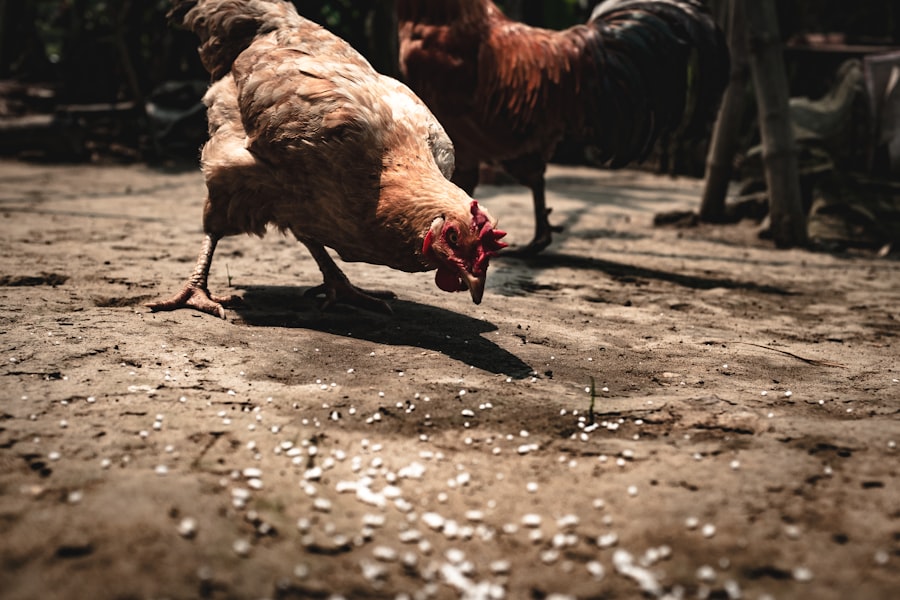Chickens, like many other animals, can exhibit aggressive behavior for various reasons. Overcrowding is a common cause, as limited space can lead to stress and territorial behavior among birds. The presence of dominant chickens within a flock may also result in aggression, as they assert their dominance through pecking and other aggressive actions.
Insufficient resources, such as food, water, and nesting space, can trigger aggressive behavior as chickens compete for these necessities. Changes in flock dynamics can also lead to aggression. Introducing new birds to an established flock may disrupt the existing pecking order, causing increased aggression as chickens compete for dominance.
Environmental factors like extreme temperatures can contribute to aggressive behavior by causing stress and irritability in chickens. Understanding these potential causes of aggression is essential for effectively addressing and managing this behavior in a flock. By recognizing factors such as overcrowding, dominance issues, resource scarcity, social changes, and environmental stressors, chicken owners can take proactive measures to mitigate aggressive behavior within their flocks.
Table of Contents
- 1 Providing Adequate Space and Resources
- 2 Introducing New Chickens Properly
- 3 Identifying and Removing Aggressive Birds
- 4 Ensuring a Balanced Diet and Nutrition
- 5 Creating a Stimulating Environment
- 6 Seeking Professional Help if Necessary
- 7 FAQs
- 7.1 What are the reasons for chickens to kill each other?
- 7.2 How can I prevent chickens from killing each other?
- 7.3 What are some signs of aggression in chickens?
- 7.4 How can I establish a pecking order among my chickens without violence?
- 7.5 Are there any specific breeds of chickens that are more prone to aggression?
Key Takeaways
- Aggression in chickens can be caused by overcrowding, lack of resources, and social hierarchy issues.
- Providing adequate space, food, water, and nesting areas can help reduce aggression in chickens.
- Introducing new chickens slowly and in a controlled manner can help prevent aggression in the flock.
- Identifying and removing aggressive birds from the flock can help maintain a peaceful environment for the rest of the chickens.
- Ensuring a balanced diet with proper nutrition is essential for maintaining the overall health and well-being of chickens.
Providing Adequate Space and Resources
Space to Move and Establish Territories
One of the most important steps in preventing aggression in chickens is to ensure that they have adequate space and resources. Overcrowding is a common cause of aggression in chickens, so providing ample space for the birds to move around and establish their own territories can help reduce stress and minimize aggressive behavior. The general rule of thumb is to provide at least 4 square feet of space per bird in the coop and 10 square feet per bird in the outdoor run.
Access to Food, Water, and Nesting Boxes
In addition to space, it is important to ensure that chickens have access to an ample supply of food and water. Competition for limited resources can lead to aggression, so providing multiple feeding and watering stations can help prevent conflicts among the birds. It is also important to provide enough nesting boxes for the hens to lay their eggs comfortably without feeling the need to compete for space.
Enrichment Activities for Mental Stimulation and Physical Exercise
By ensuring that chickens have access to adequate space and resources, chicken owners can help minimize the potential triggers for aggressive behavior within their flocks. Furthermore, providing enrichment activities such as perches, dust baths, and toys can also help reduce stress and aggression in chickens. These activities provide mental stimulation and physical exercise for the birds, helping to keep them occupied and content.
Introducing New Chickens Properly

Introducing new chickens into an existing flock can be a delicate process that requires careful planning and consideration. When new birds are introduced too quickly or without proper integration, it can disrupt the established pecking order and lead to increased aggression among the birds. To prevent this, it is important to introduce new chickens gradually and in a controlled manner.
One effective method for introducing new chickens is to use a separate enclosure within the existing coop or run. This allows the birds to see and interact with each other without direct physical contact, helping them become familiar with one another before being fully integrated into the flock. Additionally, it is important to introduce new birds during the evening when the existing flock is roosting, as this can help minimize aggressive behavior during the initial introduction.
Another important consideration when introducing new chickens is to ensure that there are enough resources available for all of the birds. This includes providing multiple feeding and watering stations, as well as ample nesting space for the hens. By ensuring that there are enough resources to go around, chicken owners can help prevent competition and reduce the likelihood of aggressive behavior during the integration process.
Overall, introducing new chickens into an existing flock requires patience and careful planning to minimize stress and aggression among the birds. By following these steps and taking the time to properly integrate new birds into the flock, chicken owners can help ensure a smooth transition and minimize potential conflicts among their chickens.
Identifying and Removing Aggressive Birds
In some cases, despite best efforts to prevent aggression, certain individual birds within a flock may continue to exhibit aggressive behavior towards others. When this occurs, it is important to identify and remove these aggressive birds from the flock to prevent further harm to the other chickens. One way to identify aggressive birds is to observe their behavior towards other members of the flock.
Aggressive birds may engage in excessive pecking, chasing, or bullying behavior towards other birds, causing them stress and potential injury. Once aggressive birds have been identified, they should be removed from the flock and housed separately from the other chickens. This can be done by setting up a separate enclosure or pen for the aggressive bird, ensuring that they have enough space and resources to live comfortably on their own.
In some cases, rehoming aggressive birds to another flock or farm may also be an option if they are not compatible with the existing flock. It is important to note that removing aggressive birds from the flock should be done with care and consideration for their well-being. Aggressive behavior in chickens can sometimes be a result of stress or underlying health issues, so it is important to monitor removed birds closely and address any potential causes of their aggression.
By identifying and removing aggressive birds from the flock, chicken owners can help protect the well-being of their other birds and maintain a harmonious environment within their flocks.
Ensuring a Balanced Diet and Nutrition
Proper nutrition is essential for maintaining the health and well-being of chickens, and it can also play a significant role in preventing aggression within a flock. A balanced diet that provides all of the necessary nutrients is crucial for keeping chickens healthy and content, which can help reduce stress and minimize aggressive behavior. One key component of a chicken’s diet is a high-quality commercial feed that is specifically formulated for their nutritional needs.
This feed should contain a balance of protein, carbohydrates, vitamins, and minerals to support overall health and vitality. In addition to commercial feed, chickens should also have access to fresh water at all times to stay hydrated and maintain proper bodily functions. Supplemental treats such as fruits, vegetables, and mealworms can also be provided in moderation as a source of enrichment and additional nutrients.
It is important to avoid overfeeding treats, however, as this can lead to nutritional imbalances and potential health issues. Furthermore, providing access to grit and oyster shell can help support proper digestion and egg production in hens. Grit aids in grinding up food in the gizzard, while oyster shell provides calcium for strong eggshells.
By ensuring that chickens have access to a balanced diet that meets all of their nutritional needs, chicken owners can help promote overall health and well-being within their flocks, which can in turn help reduce stress and minimize potential triggers for aggression.
Creating a Stimulating Environment

Providing Perches and Encouraging Physical Activity
One way to create a stimulating environment for chickens is by providing perches at different heights within the coop or run. This allows the birds to roost off the ground and gives them opportunities to jump and fly, which can help keep them active and engaged.
Enrichment Activities for Mental Stimulation
Dust baths are another important enrichment activity for chickens, as they allow the birds to engage in natural behaviors such as dusting themselves with soil or sand to keep their feathers clean and free of parasites. Providing a designated area for dust baths with loose soil or sand can help satisfy this instinctual behavior and provide mental stimulation for the birds. Additionally, providing toys such as hanging treats or puzzle feeders can also help keep chickens entertained and mentally engaged. These toys encourage natural foraging behaviors and provide a source of enrichment that can help reduce boredom and prevent potential triggers for aggression.
Reducing Stress and Aggression
By creating a stimulating environment with plenty of enrichment activities, chicken owners can help keep their birds happy and content while reducing stress and minimizing potential triggers for aggression within their flocks.
Seeking Professional Help if Necessary
In some cases, despite best efforts to prevent or manage aggression within a flock, certain situations may require professional intervention from a veterinarian or animal behaviorist. If aggressive behavior persists despite implementing various management strategies or if it escalates to the point of causing harm or injury to other birds, it may be necessary to seek professional help. A veterinarian with experience in poultry health can help assess the overall health of the flock and identify any potential underlying health issues that may be contributing to aggressive behavior.
They can also provide guidance on proper nutrition, parasite control, and disease prevention measures that can help support overall well-being within the flock. Additionally, an animal behaviorist with expertise in poultry behavior can provide valuable insight into understanding the root causes of aggression within a flock and offer guidance on effective management strategies. They can help develop a customized plan for addressing specific behavioral issues within the flock and provide recommendations for creating a harmonious environment that promotes positive social interactions among the birds.
By seeking professional help when necessary, chicken owners can gain valuable support and guidance in addressing aggression within their flocks while promoting overall health and well-being for their birds. In conclusion, understanding the potential causes of aggression in chickens is crucial for effectively addressing this behavior within a flock. By providing adequate space and resources, introducing new chickens properly, identifying and removing aggressive birds when necessary, ensuring a balanced diet and nutrition, creating a stimulating environment, and seeking professional help if needed, chicken owners can take proactive steps to prevent aggression and promote overall well-being within their flocks.
With careful management and consideration for the needs of their birds, chicken owners can create a harmonious environment that supports positive social interactions among their flock while minimizing potential triggers for aggression.
If you’re looking for ways to prevent chickens from killing each other, you may also be interested in learning about how to design the interior of your chicken coop to promote a peaceful environment. Check out this article on chicken coop interior ideas for tips on creating a comfortable and harmonious space for your flock.
FAQs
What are the reasons for chickens to kill each other?
Chickens may kill each other due to overcrowding, lack of space, pecking order disputes, stress, illness, or nutritional deficiencies.
How can I prevent chickens from killing each other?
To prevent chickens from killing each other, provide adequate space, ensure a balanced diet, reduce stress, and separate aggressive birds if necessary.
What are some signs of aggression in chickens?
Signs of aggression in chickens include pecking, feather plucking, chasing, and aggressive vocalizations.
How can I establish a pecking order among my chickens without violence?
To establish a pecking order without violence, introduce new chickens gradually, provide multiple feeding and watering stations, and ensure plenty of space for all birds to establish their own territories.
Are there any specific breeds of chickens that are more prone to aggression?
Some breeds, such as Rhode Island Reds and Leghorns, are known to be more aggressive than others. However, individual temperament can vary within any breed.
Meet Walter, the feathered-friend fanatic of Florida! Nestled in the sunshine state, Walter struts through life with his feathered companions, clucking his way to happiness. With a coop that’s fancier than a five-star hotel, he’s the Don Juan of the chicken world. When he’s not teaching his hens to do the cha-cha, you’ll find him in a heated debate with his prized rooster, Sir Clucks-a-Lot. Walter’s poultry passion is no yolk; he’s the sunny-side-up guy you never knew you needed in your flock of friends!







